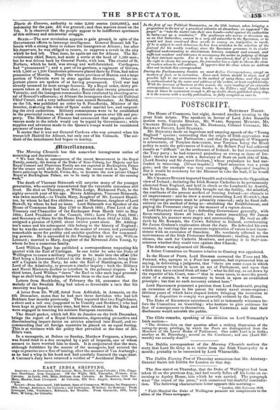EAST INDIA SHIPPING.
Anitmn.— At Gravesend, 10th instant, Mary, Readell, from Calcutta ; 11th, Clogs- lese, Hutchison, from Singapore. Off the Wight, 16th, Timandra, Skinner, from Calcutta. At Leith. 10th, Blair, Oldham. from Calcutta. At Mauritius, 11th Nov. Mary, Mackie, from Liverpool. At Calcutta, 22d Dec. Argyle, Kenney, from the Clyde.
SAILED—From Gravesend, 14th instant, Sons of Commerce. Williams, far Singapore ; 15th, George, Anderson, for Calcutta ; and Inckinuan, M'Arthar, fur Bombay. From Liverpool, 19th, Vindicator, Robinson, for Manilla. From Greenock, 10th, Lady Bute, M'Inlay, for Calcutta. In the _first of our Political Summaries, on the 10th instant, when bringing a proposition to the test of a practical reductio ad absurdum, we supposed" the people" to "take the mutter into their own hands—rebel against the authorities de facto—set up a revolution." The gentleman who warns or threatens us, as an Otd Subscriber, cannot be a very old subscriber to the Spectator, or he would not have construed those words to convey an instigation to revolt. If he is subject to such delusions, he has been mistaken in the selection of the journal for his weekly reading; since the Spectator presumes in its reader sufficient understanding to discriminate between comment and counsel, and sufficient candour and tolerance to accompany the writer in judging of things by their intrinsic merits. For it is to be remembered, that if a reader has the right to choose his newspaper, the journalist has a right to choose the class of readers whom he will address. It appears that the class whom we address does not include this correspondent.
During the Parliamentary Session we must decline Correspondence, except on matters of fact, or in correction. Even such letters should be short, and if possible left to our convenience in the method of using them; and they must be authenticated by the name and address of the writer, at least confidentially. With the increase of business at this season, the mere reading of an extensive correspondence becomes a serious burden to the Editor; and though letters may at times be convenient enough to fill up double sheets published every day, it is the reverse with a weekly publication, so fully occupied as ours is.


























 Previous page
Previous page